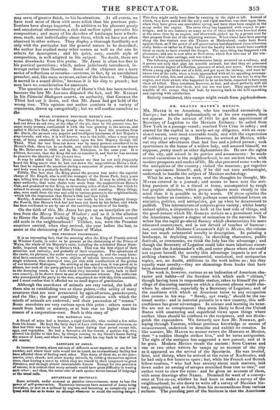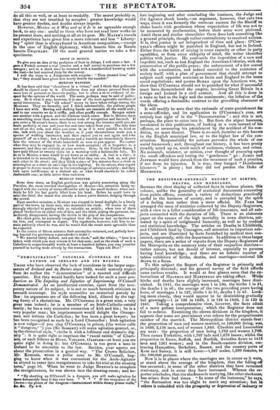MR. BRANTZ MAYER'S MEXICO.
MR. MAYER is an American, who has travelled extensively in Europe ; but whether diplomatically or at his own expense, does not appear. In the autumn of 1841 he got the appointment of Secretary of Legation to the Mexican Embassy : he sailed from New York in a passage-vessel ; reached Vera Cruz in safety ; and started for the capital in a newly-set-up diligence, with an occa- sional escort, over most execrable roads, and with the expectation of robbery at every stage. However, he arrived at Mexico, with- out any other adventures than bad fare and a jolted person ; took apartments in the house of a widow lady, and amused himself, we suppose, pretty much as other diplomatists do. He saw the sights of the city, and mixed in its parties and amusements : he made several excursions in the neighbourhood, to see ancient ruins, with modern prospects and modes of life. He also procured some works on the antiquities of the country ; visited the museum ; got together some specimens himself; and, if he did not turn archmologist, undertook to handle the subject of Mexican archaeology.
What he saw, where he went, and the thoughts he thought, Mr. Mama entered in a journal ; and seems to have sent the stri- king portions of it to a friend at home, accompanied by rough but graphic sketches, which present objects more clearly to the mind than it is possible to do by words. Of these epistles the volume before us consists; with perhaps some additional letters on statistics, politics, and antiquities, got up when he determined to publish. This intermixture of subjects gives variety ; whilst hearty animal spirits, a disposition to look at the best side of things, and the good-nature which Mr. GODLEY notices as a prominent trait of the Americans, impart a degree of animation to the narrative. The writer has the rapid go-ahead fluency which characterizes Isis more educated countrymen, and is not devoid of touches of humour : but, coming after Madame CALDERON'S Life in Mexico, the volume has not much substantial novelty in description. In painting a landscape, in depicting society, in sketching characters, public festivals, or ceremonies, we think the lady has the advantage ; and though the Secretary of Legation could take more laborious excur- sions than the Ambassador's wife, and enter places where she could not expose herself, the novelty this advantage imparts is not of a striking character. The commercial, statistical, and antiquarian topics, are, no doubt, additions to the work before us ; but they equally want novelty—they are skimmings from books that have been skimmed already.
The work is, however, curious as an indication of American cha- racter and habits—of the freedom with which each "citizen," though having been in responsible station, takes to himself the pri- vilege of discussing matters on which a discreet silence would else- where be observed, especially by a Secretary of Legation; and of the readiness with which an American turns to any occupation that comes in his way. " Ready, aye ready," should be the na- tional motto : and in material pursuits in a new country, this self- confidence has great advantages. In science and learning its bene- fits are not so conspicuous : they seem likely to flood the United States with smattering and superficial views upon things where surface ideas should be confined to the recipients, and not distin- guish the expounders. We formerly saw how Mr. NORMAN, gal- loping through Yucatan, without previous knowledge or means of measurement, undertook to describe and exhibit its remains. In like manner, Mr. MAYER no sooner enters the Museum at Mexico, than "a sudden thought strikes him," and he turns antiquarian. The sight of the antiques has suggested a new pursuit, and at it
he goes. Modern Mexico recals the ancient : from Comm and one or two other writers he vamps up an account of the city as it appeared on the arrival of the Spaniards. He was broiled, faint, and thirsty, when he arrived at the ruins of Xochicalco, and he had only a few hours to spare ; but, while his French and Scotch fellow-tourists, " who had less anxiety about such matters, laid down under an awning of serapes stretched from tree to tree," our author went to view the ruins: and he gives an account of them, with some drawings after NEBEL. Detained for want of a convey- ance at Tez-co-co, whither he had been to make a survey of the neighbourhood, he sits down to write off a survey of Mexican his- tory, antiquities, and so forth, from his memorandums from various authors. The puzzling part of the business is that the Americana do all this so well, or at least so readably. The secret probably is, that they are not troubled by scruples : greater knowledge would have greater doubts, and doubts always impede.
However, Mexico as it Was and as it Is is an agreeable enough book, to any one : useful to those who have not read later works on its preaent state, and nothing at all on its past. Mr. MAYER'S travels and experience have given him a more tolerant and less " Liberty- boy " spirit than is always found in American composition,—except In the case of English diplomacy, which haunts him as Russia haunts URQUHART. Of the more general matter we take a few specimens.
FRUIT IN MEXICO.
To give you an idea of the profusion of fruit in Jalapa, I will state a fact. I gave a French servant a real (twelve and a half cents) to purchase me a few mange.; and in a short time he returned with a handkerchief bursting under the load—he had received forty for the money.
I told the story to a Jalapenian with surprise : "They cheated him," said he; "they should have given him nearly doable the number."
MEXICAN MANNERS.
It has been said that "cleanliness is a virtue," and I think that politeness' should be classed next to it. Cleanliness does not always proceed from the mere love of personal or domestic purity, but is often a mere evidence of re- spect for the opinion of the world. The same, perhaps, may be said of polite- ness. Be it what it may, however, it is one of the most agreeable sacrifices of social intercourse. The "old school" seems to have taken refuge among the Mexicans. They are formally, and I think substantially, the politest people I have met with. Bowing and shaking hands are common all the world over ; NM in our country we do it stiffly, and often gruffly enough. Savages salute me another with a grunt, and the Chinese touch noses. But in Mexico there is something more than mere nonchalant nods of recognition and farewelL If you enter a Mexican's house, there is no rest among the inmates until you are made perfectly at ease and your hat and cane taken from you. The lady does not sit on the sofa, nod when you come in as if it were painful to bend or rise, talk with you about the weather as if your rheumatism; made you a species of walking barometer, and then expect you to nod again and take yourself off as a bore ; but a frankness and a warmth are immediately thrown into the manner of the whole household as soon as you appear. No matter what they may be engaged in, or how much occupied ; all is forgotten in a moment, and they are entirely at your service. Here, in the United States, 1 have Raid fifteen or twenty visits on a morning with a fashionable lady. To do so in Mexico, a man would be set down as an oddity. A. visit is a visit ; it is intended to be something. People feel that they can see, look at, and pass each other iv the street; and they think a stare of five minutes from a chair as meaningless as a stare on one's legs in the highway. In the saloon, they regard it proper to devote much time to the interchange of opinions sociably ; and they look upon indifference or a distrait air, or what would elsewhere be called fashiosabk ease, as little better than rudeness.
MEXICAN THIEVES.
Some time since, an English gentleman was quietly sauntering ajong the Portalea, the most crowded thoroughfare of Mexico—his attention being oc- cupied with the variety of wares offered for sale by the small dealers; when sud- denly he felt his hat gently lifted from his head. Before be could turn to seize the thief, the rascal was already a dozen yards distant, dodging through the crowd.
'upon another occasion, a Mexican was stopped in broad daylight, in a lonely part of the town, by three men, who demanded his cloak. Of course he very strongly objected to parting with so valuable an article; when two of them placed themselves on either side of him, and the third, seizing the garment, im- mediately disappeared, leaving the victim in the grip of his companions. His cloak gone, he naturally imagined that the thieves had no further use for him, and attempted to depart. The vagabonds, however, told him to re- main patiently where he was, and he would find the result more agreeable than he expected.
In the course of fifteen minutes their accomplice returned, and, politely bow- ing, handed the gentleman a pawnbroker's ticket! "We wanted thirty dollars, and not the cloak," said the villain., "here is a ticket, with which you may redeem it for that sum ; and as the cloak of such a Caballero is unquestionably worth at least a hundred dollars, you may consider yourself as having made seventy by the transaction. Vaya con Dios!"



























 Previous page
Previous page